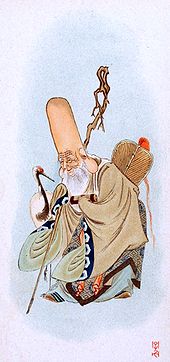




InJapan, Fukurokuju (福禄寿; from Japanese fuku, "happiness"; roku, "wealth"; and ju, "longevity") is one of the Seven Lucky GodsinJapanese mythology.[1] It has been theorized that he is a Japanese assimilation of the Chinese Three Star Gods (Fu Lu Shou) embodied in one deity. Most related in appearance to the Chinese star god Shou, he is the God of wisdom and longevity.[2] According to some, before attaining divinity, he was a Chinese hermit of the Song dynasty and a reincarnation of the Taoist Deity, Xuantian Shangdi. It is said that during his human incarnation, he was a sennin; a immortal who could exist without eating food.
Fukurokuju probably originated from an old Chinese tale about a mythical Chinese Taoist hermit sage renowned for performing miracles in the Northern Song period (960–1127). In China, this hermit (also known as Jurōjin) was thought to embody the celestial powers of the south polar star. Fukurokuju was not always included in the earliest representations of the Seven in Japan. He was instead replaced by Kisshōten (goddess of fortune, beauty, and merit). He is now, however, an established member of the Seven Lucky Gods.[3]
He is sometimes confused with Jurōjin, another of the Several Gods of Fortune, who by some accounts is Fukurokuju's grandson and by other accounts inhabits the same body as Fukurokuju.[4] As such, the two are often confused.[5]
Fukurokuju is usually portrayed as bald with long whiskers and an elongated forehead.[1] He is said to be an incarnation of the "Southern Polestar" (南极老人, literally Old Man of the South Pole), also known as the star Canopus outside of Asia. The sacred book tied to his staff either contains the lifespan of every person on earth or a magical scripture. He is accompanied by a crane and a turtle, which are considered to be symbols of longevity. He is also sometimes accompanied by a black deer (ancient legends say a deer turns black if it is over 2000 years old).
He is the only member of the Seven Lucky Gods credited with the ability to resurrect the dead.
|
| ||
|---|---|---|
| Mythic texts |
| |
| Japanese creation myth |
| |
| Takamagahara mythology |
| |
| Izumo mythology |
| |
| Hyūga mythology |
| |
| Human age |
| |
| Mythological locations |
| |
| Mythological weapons |
| |
| Major Buddhist figures |
| |
| Seven Lucky Gods |
| |
| Legendary creatures |
| |
| Other |
| |
| ||
This article relating to Japanese mythology is a stub. You can help Wikipedia by expanding it. |